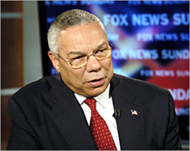Syria in Washington’s crosshairs
After the fall of Saddam Hussein and the return of Libya to the international fold, Washington considers Syria as one of the last recalcitrant Arab states.

Analysts say this is a key factor behind the recent US muscle-flexing with Syria.
Beginning with a UN Security Council resolution targeting the Syrian military presence in Lebanon, in recent weeks the US has come down hard on Damascus.
The US position that Syria bore some responsibility for the recent Beir Saba bus bombing gave Israel what analysts describe as a “green light” for Tel Aviv’s assassination of a Hamas official in Damascus on Sunday.
A different picture
In contrast to US accusations, some observers say Syria has sought to meet many of Washington’s demands and that it is being targeted unfairly by the US.
“No matter what the Syrians do, they are in the crosshairs of Washington,” Murhaf Jouejati, of the Middle East Institute in Washington, told Aljazeera.net.
Rim Allaf, associate fellow at the Royal Institute for International Affairs in London, said: “The Syrians have bent over backwards and the Americans still don’t pay attention.”
Peace talks
Behind the rhetoric there is evidence to suggest Syria is keen to cooperate with the US and play a role in restarting the peace process.
 |
|
Syria is ready to reopen talks on |
In November 2003, Syrian President Bashar al-Asad signalled that he wanted to restart negotiations with Israel in an interview with the New York Times.
“It is not something new. Syria has always showed it was ready to reopen negotiations,” said Ammar al-Arsan, press secretary at the Syrian Embassy in Washington, speaking to Aljazeera.net.
“The Israelis are always looking for reasons not to open negotiations,” he added.
Proposal rejected
Israeli Prime Minister Ariel Sharon recently told the Haaretz daily he rejected a US proposal to reopen negotiations with Syria back in November last year.
Israeli officials cite Syria’s support for the Palestinian groups Hamas and Islamic Jihad as a reason why it cannot hold talks with Syria.
But analysts Jouejati and Allaf poured cold water on Israeli and US claims that Hamas and Islamic Jihad’s wings in Syria direct operations inside the Palestinian territories.
“I never really believed it was possible to plan these things [bombings] from outside the West Bank and Gaza. Hamas and Islamic Jihad have more than enough people on the ground,” Allaf said.
|
“I never really believed Rim Allaf, |
“I don’t even think the Israelis or the US believe that Khalid Mishal is responsible,” she added.
Mishaal is the head of Hamas’ political wing in Damascus.
According to Jouejati: “The Syrians are being very, very cautious and when they are being cautious, their proxies are being cautious.”
Syria closed Hamas’ and Islamic Jihad’s offices in Damascus last year under US pressure.
Cooperation on Iraq
In addition to the peace process with Israel, Syria also appears to be cooperating with the US on Iraq.
“From the day of raising this subject we showed willingness to cooperate to improve the situation on the border,” al-Arsan, the Syrian embassy press secretary in Washington, said.
“Syria is very interested in seeing Iraq without occupation and with its people living peacefully.”
Earlier this month, the pan-Arab al-Hayat newspaper reported that Syria had played a role in negotiating an end to the fighting between Muqtada al-Sadr’s militia and US and Iraqi government forces in the Iraqi city of Najaf.
 |
|
Powell said Syria’s approach to |
On Monday US Secretary of State Colin Powell said that talks between the US, Iraq and Syria on securing the 350-mile Iraqi-Syria border were underway.
Powell said Damascus had taken a “positive” approach in addressing US concerns.
Some observers say the assassination of Izz al-Din al-Shaikh Khalil on Sunday, which Israeli security sources claimed responsibility for, was an Israeli attempt to sabotage any newly found cooperation with the US.
“Israel is trying to embarrass Syria by portraying Damascus as a safe haven for terrorists at a time when Syria appears to be inclined to meet US demands on several issues including support for Palestinian groups,” Reuters quoted an Arab diplomat in Damascus as saying on Monday.
Lebanon hijacked
Despite Syria’s recent withdrawal of 3000 troops from Lebanon, Damascus is still powerful in Lebanon.
The UN Security Council resolution on Lebanon was sponsored by the US and France in response to Syria’s support for extending the term of Lebanese president Emile Lahud.
|
“The US doesn’t mind the Syrians being there because they are the only party that can Murhaf Jouejati, |
But many doubt the sincerity of Washington and Paris’ interest in Lebanese sovereignty.
“The pro-Israeli lobby, in tandem with the Lebanese right-wing, took advantage of the situation to push the administration towards ostracising Syria, a country who is now the only Arab challenger to Israel’s regional hegemonic ambitions,” Jouejati said.
Jouejati speculated that for the time-being the US actually wanted the Syrians to remain in Lebanon.
“The US doesn’t mind the Syrians being there because they are the only party that can rein in Hizb Allah,” he said.
Political pressure
Jouejati pointed to the US support for Syria’s 1976 intervention in the 1975-1990 Lebanese civil war, and US acquiescence in Syria’s presence in Lebanon at the end of the civil war in return for its support for the 1991 Gulf war.
“Either American policy in the region is inconsistent or they are escalating pressure on Syria,” he said.
 |
|
Syria keeps a 16,000-strong |
French cooperation with the US over the Security Council resolution suggests Paris is keen to mend relations with the US and regain its stance in the Middle East.
But Jouejati thought a reason behind France’s stance might be more simple.
“France is miffed at the fact that Syria gave an oil contract worth around $850 million to a US-Canadian oil company,” he said.
Losing support
Yet, it is clear the Syrians are at risk of losing international support at a time when they can least afford it.
Despite Syria’s defiant response to the assassination of Khalil most doubt that Damascus can take action.
“There is a feeling in Israel and in some places in Washington that Syria is so weak that it is possible to narrow Damascus’ margin of manoeuvre with little chance of backlash,” Lebanese political analyst Michael Young told Reuters.
“If there is another attack in Israel, the Israelis pretty much have the green light,” Allaf said.
Miscalculations
Allaf said the Syrians had miscalculated the international reaction to its support for an extension for a renewed term for Lahud.
“I think they are a bit surprised that Europe and the US are coming towards one line,” she said.
Allaf suggested that despite its concessions, Syria’s support for Hizb Allah was risky given the realities of the post-September 11 world.
“Three years later the Syrians don’t understand. It’s not the same game any more. Israel left Lebanon and Hizb Allah is still active,” she said.
“The Syrians have a lot of just causes but they are getting lost.”